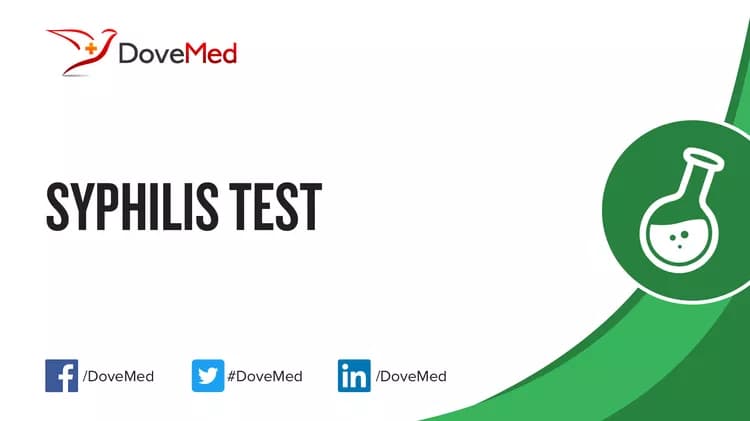What are the other Names for this Test? (Equivalent Terms)
- Automated Immunoassays for Syphilis Antibodies Test
- Darkfield Microscopy Test
- Fluorescent Treponemal Antibody Absorption Test
What is Syphilis Test? (Background Information)
- Syphilis is a sexually transmitted infection (STI) caused by the spiral-shaped bacterium Treponema pallidum. It is one of the most prevalent STIs that can become dangerous and life-threatening, if left untreated
- T. pallidum is very sensitive to environmental conditions. It cannot penetrate unbroken skin. It requires intimate contact, such as sex, to spread from one individual to another. It can also spread to the fetus during pregnancy
- Syphilis is a complex disease with three stages of progression.
The first stage is called primary syphilis. It lasts anywhere from 2 weeks to 2 months. During this time, T. pallidum actively replicates at the site of infection. A painless lesion called a chancre is formed
The second stage is called secondary syphilis. T. pallidum spreads from the initial infection site to the eyes, joints, central nervous system, or other body areas. A characteristic secondary skin rash is observed during this stage
The third stage is called tertiary syphilis. This is a variable stage where the individual may experience minor infections of the bone and mouth (causing a lesion called a gumma) or severe heart and nerve infections
- Recognizing a syphilis infection during its early stages makes it possible to rapidly cure the disease. However, progression of syphilis to its later stages complicates treatment because T. pallidum, by then, has spread throughout the body
- Syphilis Tests are used to identify Treponema pallidum infection in a variety of scenarios. Several of the main tests and their uses are as follows:
- Syphilis Serology: This blood test is routinely ordered as a prenatal work-up and screen for donated blood
- Automated Reagin Testing (ART), Rapid Plasma Reagin (RPR), Venereal Disease Research Laboratory (VDRL) Test: For routine screening of susceptible individuals
- Fluorescent Treponemal Antibody Absorption Testing (FTA-ABS), Microhemagglutination-Treponema pallidum (MHA-TP): These are confirmatory tests for samples that screen positive using other tests
What are the Clinical Indications for performing the Syphilis Test?
Following are the clinical indications for performing Syphilis Tests:
- Routine screening for sexually transmitted infections
- Routine screening of donor blood, prior to blood transfusion
- Routine screening of fetus or newborn
- After the detection of a painless lesion (chancre) on the genitals
- Widespread skin rash
- Raised lesion on the mouth (gumma)
- Fever
- Fatigue
How is the Specimen Collected for Syphilis Test?
Following is the specimen collection process for Syphilis Tests:
Sample required: Blood, skin sample
Process of obtaining blood sample in adults:
- A band is wrapped around the arm, 3-4 inches above the collection site (superficial vein that lies within the elbow pit)
- The site is cleaned with 70% alcohol in an outward spiral, away from the zone of needle insertion
- The needle cap is removed and is held in line with the vein, pulling the skin tight
- With a small and quick thrust, the vein is penetrated using the needle
- The required amount of blood sample is collected by pulling the plunger of the syringe out slowly
- The wrap band is removed, gauze is placed on the collection site, and the needle is removed
- The blood is immediately transferred into the blood container, which has the appropriate preservative/clot activator/anti-coagulant
- The syringe and the needle are disposed into the appropriate “sharp container” for safe and hygienic disposal
- Process of obtaining a skin sample: Gently scraping the skin of the anus, genitals, or inside of the mouth.
Preparation required: No special preparation is needed prior to the test.
What is the Significance of the Syphilis Test Result?
- A positive finding for the Syphilis Test may indicate syphilis and infection with Treponema pallidum
The laboratory test results are NOT to be interpreted as results of a "stand-alone" test. The test results have to be interpreted after correlating with suitable clinical findings and additional supplemental tests/information. Your healthcare providers will explain the meaning of your tests results based on the overall clinical scenario.
Additional and Relevant Useful Information:
- Along with chlamydia and gonorrhea, syphilis ranks as one of the most prevalent sexually transmitted infections (STIs) among individuals aged 10-24 years
- Syphilis is often transmitted alongside gonorrhea; however, it is more dangerous than gonorrhea. Gonorrhea causes roughly 1,000 deaths per year worldwide, whereas syphilis causes close to 100,000 deaths
Certain medications that you may be currently taking may influence the outcome of the test. Hence, it is important to inform your healthcare provider of the complete list of medications (including any herbal supplements) you are currently taking. This will help the healthcare provider interpret your test results more accurately and avoid unnecessary chances of a misdiagnosis.
Related Articles
Test Your Knowledge
Asked by users
Related Centers
Related Specialties
Related Physicians
Related Procedures
Related Resources
Join DoveHubs
and connect with fellow professionals


0 Comments
Please log in to post a comment.